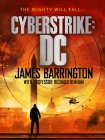Cyberstrike, James Barrington [short story to read .TXT] 📗

- Author: James Barrington
Book online «Cyberstrike, James Barrington [short story to read .TXT] 📗». Author James Barrington
In that regard, operating in England was much safer, because the British always obeyed the rules that they themselves had created, something which Sadir had never really understood. But he did know that if he was caught planning some kind of atrocity – the word that the Western media seemed to use with increasing frequency when discussing Islam – in the United Kingdom, the absolute worst that could happen to him would be a long but fairly comfortable incarceration in some prison. In America, the same action would almost certainly see him either strapped to an electric chair waiting for somebody to throw the switch or tied to a purpose-built gurney ready to be given a lethal injection.
In reality, Sadir was still confident that although his presence in Washington might have been noticed by the FBI, they had no idea of the scope of the operation that he was planning. And in the absence of any hard information, the possibility of a booby-trap in his car was fairly remote. But it was still a possibility, so he took precautions.
He used the remote control to unlock the car from as far away as possible, pressing the control into the side of his head as he pressed the button. He had no idea why, but he knew that doing that extended the range of the device by several feet.
When he reached the Honda, he opened the boot and took out an extendable rod with a battery-powered torch and a mirror screwed on to the end of it. He switched it on, slid the mirror underneath the car and carefully examined every part of the underside of the vehicle from the front to the rear bumper. And saw nothing out of place, which was exactly what he had expected.
Then he popped the bonnet and used a different torch to look all around the engine and ancillary equipment. This time, he wasn’t only looking for explosives but for any kind of a small box that might conceal a tracker. When he was satisfied, he used the torch and mirror once again to make a final check inside the wheel arches. All his checks were negative, which was what he had both hoped and expected. But checking was never a waste of time, because his life might depend on it.
A couple of minutes later he drove out of the multi-storey and turned south – he had no option about this because that bit of 19th Street was one way – and then followed a somewhat meandering route to the north-east and up into Maryland. He continued as far as Bladensburg before making a left towards Riverdale Park and then continued north towards Damascus.
The cars that stand out in traffic are those that are visually unexpected, like a lime-green Lamborghini or a pink Hummer or something equally exotic or stupid and, on a more mundane level, cars that travel either too fast or too slow. Those are the vehicles that people notice, and more importantly they are also the vehicles that the police notice, and so Sadir ignored the posted speed limits and simply ensured that he was travelling at the same speed as everybody else, maintaining his place in the lines of traffic as he drove out of the built-up area.
He had nothing illegal about his person or in the car, although the mirror and torch on the pole in the boot would probably raise an eyebrow if he were to be stopped, on the grounds that normal law-abiding American citizens do not normally carry purpose-built devices for checking the undersides of their vehicles. But all in all, it was better not to be pulled over for some kind of minor traffic offence to avoid his name becoming known to any branch of American law enforcement, so Sadir simply trundled along in his average and invisible Honda, just one more anonymous vehicle in a line of other anonymous vehicles.
A little over an hour after he’d sat down in the driving seat of the car, he steered it off the road and up the tarmac driveway of the house in Damascus.
He switched off the engine, opened the driver’s door and for a few seconds simply stood there beside the vehicle, staring directly towards the property. If he’d arrived by night, he would have been staring into the glare of the two floodlights mounted on the front of the house and fitted with PIR sensors to detect any arrival. His temporary immobility was a simple visual confirmation to the three men in the house of his identity. He knew they were armed, and that at least one of them would have been staring at the car over the sights of a weapon as the vehicle had approached.
He waited until the front door opened and then stepped forward, walking through the porch and into the house.
‘As-salam alaykum, Abū Tadmir,’ the man who’d opened the door said in traditional greeting, and Sadir made a standard response: ‘Wa alaykum as-salam’ – meaning ‘and peace unto you’.
‘You are very welcome here, my brother.’
Although he hadn’t seen this man or the other two people in the house for almost a year,





Comments (0)